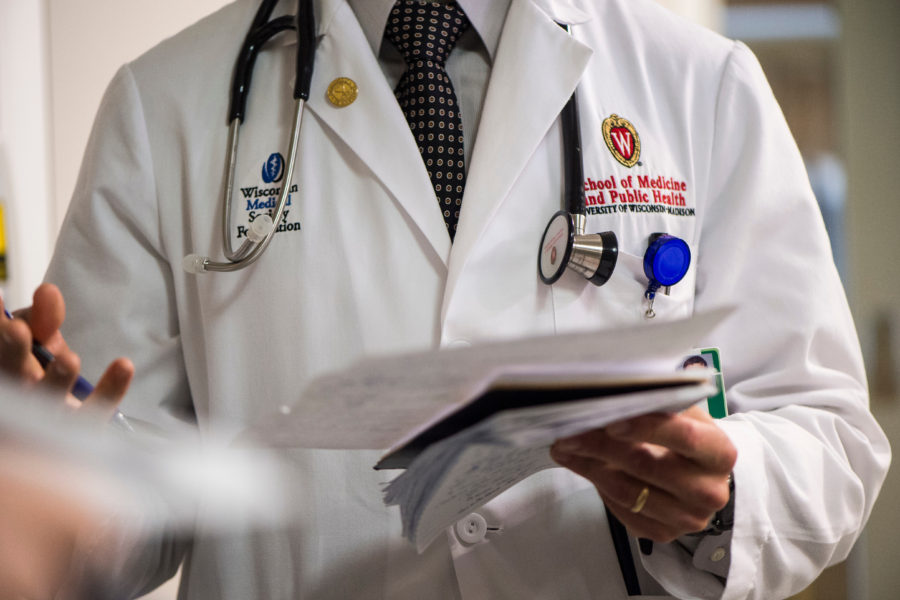The UW Carbone Cancer Center (UWCCC) Cancer Prevention and Control (CPC) Program’s mission is to identify effective approaches to reduce the burden of cancer for patients, their families, and communities through improved prevention, early detection, and survival.
![]()
The Cancer Prevention & Control (CPC) Program spans basic, clinical, and population science to identify effective approaches to reduce the burden of cancer for patients, their families, and communities through improved prevention, early detection, and clinical care. This goal is consistent with the mission of the UWCCC to defeat cancer through rapid application of groundbreaking research to education, prevention, and treatment. The CPC Program fills a central role in supporting population health research—a priority area of research—as well as fostering multidisciplinary team science and enhancing internal and external partnerships in support of the Center’s mission.
Thematic Aim 1: Identify promising chemopreventive targets and agents to test in clinical trials. CPC members lead 1 of 5 NCI-support Chemoprevention Consortia sites and seek to decrease the incidence of cancer and its progression through agent development and clinical testing.
Thematic Aim 2: Identify and implement effective approaches to reduce tobacco-related cancers.Tobacco contributes to one-third of all cancer deaths and CPC members develop studies to improve treatment options and community engagement.
Thematic Aim 3: Identify new strategies to improve the delivery of cancer care. CPC researchers focus on improving screening, detection, and treatment in our catchment area and beyond, to improve outcomes and reduce cost.
Cancer Prevention & Control Membership
View all Cancer Prevention and Control program members at UWCCC
Select Recent Accomplishments
This is an accordion element with a series of buttons that open and close related content panels.
Promising Chemopreventive Targets and Agents
Developing promising chemopreventative targets and agents requires both preclinical discovery and clinical application. CPC members have made substantive progress in each aspect of this process.
Preclinical Discovery
- Mukhtar, and Khan have observed that transcription/translation regulatory Y-box binding protein-1 (YB-1) expression is increased with carcinoma progression and inversely proportional to E-cadherin expression.
- Matkowskyj, Deming (DT), and Halberg (GEM) examined th role and “targetability” of PIK3CA mutations in colon carcinogenesis via a novel transgenic model. This research demonstrated first time evidence that AKR1B10 is a unique biomarker involved in hepatocellular carcinogenesis via modulation of proliferation and cell apoptosis and thus a potential promising biomarker for blocking carcinogenesis
Clinical Application
- Bailey, Downs, Kim, and Mukhtar led a UWCCC consortium Phase 2 Trial of polyphenon E or placebo administered to participants with bladder neoplasia undergoing resection. Follow-up studies are under development.
- Trentham-Dietz, and Gould (GEM) identified a locus, Mcs5a, as strongly associated with breast cancer risk in both rodent models and humans. Gould and Gumperz (VR) determined this locus prevents breast cancer through down regulation of ubiquitin ligase Fbox10 in T lymphocytes.
Tobacco-related Cancer Progress
Tobacco research has long been an area of strength at the UWCCC, as evidenced by national recognition through prestigious awards and leadership on federal committees. Researchers have also been instrumental in developing novel treatments and programs to reduce tobacco usage.
- Fiore, named a 2014 UW Hilldale Professorship given to faculty members with outstanding research and promise of continued activity.
- Piper named the 2014 Jarvik-Russel Young Investigator Awardee by the Society for Research on Nicotine and Tobacco for extraordinary contributions to the field.
- Fiore and Baker received $12 million for a 5-year program project from the NCI titled “Breaking Additiction to Tobacco for Health” or BREATHE. CPC researchers are testing new phased-based smoking cessation treatments for patients that coordinate advanced electronic health record (EHR) systems and advanced treatment procedures
Translating Research to Clinical Application
The CPC Program conducts research across all phases of the cancer trajectory from prevention, screening, and diagnosis to survivorship and end-of-life care. As a result, our research teams are widely multidisciplinary and bridge sciences including engineering, human development and family studies, kinesiology, medicine, nursing, pharmacy, population health, psychiatry, social work, and surgery. Examples of CPC research include the following.
- Studies advancing cancer detection and diagnosis, including use of simulation modeling to identify new approaches to breast cancer screening (Alagoz, Burnside, Gangnon, Trentham-Dietz).
- Evaluation of physical activity interventions to reduce sedentary behavior and improve health in patients during and after cancer treatment (Cadmus-Bertram)
- Research developing and testing system-level interventions to improve care delivery, coordination, and follow-up during screening and as cancer survivors transition from active treatment to surveillance (Greenberg, Newman, Sesto, Tevaarwerk)
- Implementation and evaluation of clinical tools and strategies to improve patient-provider communication, enhance shared decision-making, and achieve goal concordant care, especially for those facing difficult treatment choices and end-of-life decisions (Campbell)
- Studies to identify and improve management of symptoms, facilitate coping, and enhance quality of life among cancer patients and their caregivers (Hutson, Kwekkeboom, Litzelman)
